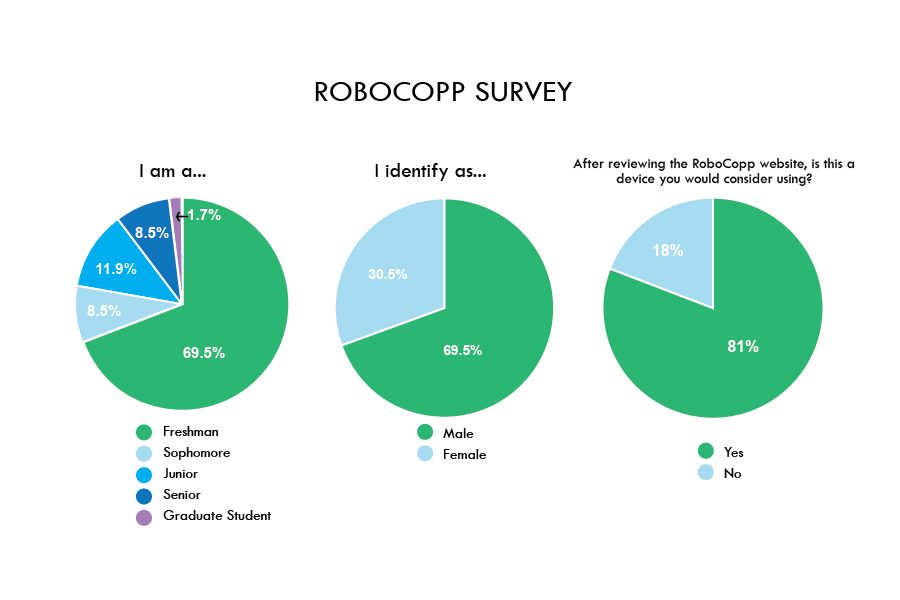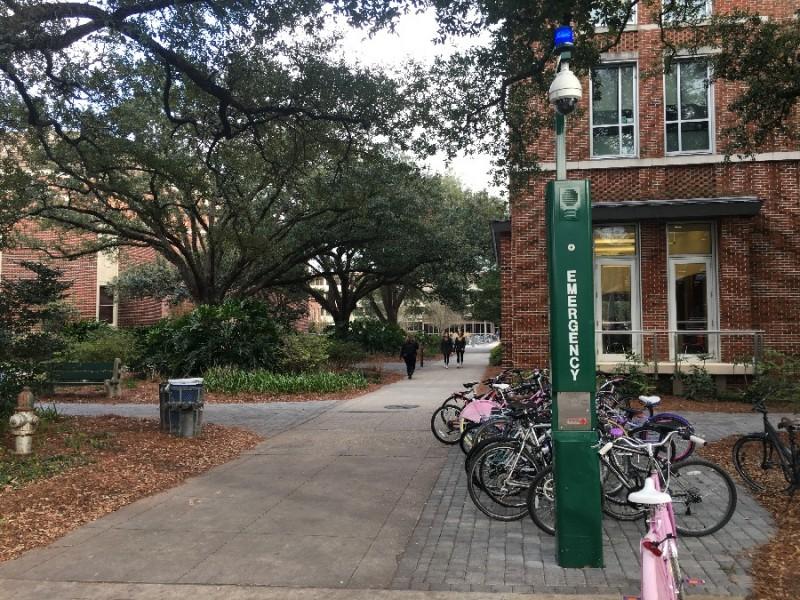Technology offers new approach to campus safety
Lily Milwit | Senior Staff Photographer
The blue light emergency system can be found at multiple locations on and around campus. TUPD and students have recently started using other forms of technology to promote safety on campus.
Campus safety is a top priority at American universities, but the range of the blue light phone system only extends so far. The last few years have seen a significant increase in campus safety technology and the potential for more to come.
Tulane University Police Department continued the rollout of officer body cameras, a process that began in 2015. The department also introduced the use of closed-circuit television, video surveillance cameras and digital notebooks for officers.
TUPD Superintendent John Barnwell said incorporating new technology into the police force is critical for student safety.
“In order to be successful in a [student] body, the best environment for safety and security, you have to embrace technology …,” Barnwell said.
Barnwell said the Rave Guardian, a free mobile application that provides students with a virtual escort, is one of the most prominent safety technology options for students. The app alerts friends or TUPD if the user does not reach their destination by the time they estimated.
Michelle Story, director of student safety for the Undergraduate Student Government, said she believes the Rave Guardian system has been very successful.
“I do see TUPD making great strides to ensuring that they incorporate any new technological achievements into how they protect the students,” Story said. “My primary example of that would be Rave Guardian.”
Some students, however, still do not feel completely safe on and off campus. Senior Emma Saltzberg uses Rave Guardian when walking home but prefers to call a TapRide escort to pick her up. She said she still feels a degree of discomfort no matter what technology is in use.
“We should avoid walking home at night in general because it’s risky no matter what technology is involved,” Saltzberg said.
Despite his satisfaction with Rave Guardian, Barnwell said that his job to pursue the use of technology and campus safety is a never-ending one.
“… You have to constantly be fluid because if you ever feel like you’ve reached a mountain top, then you’re not doing yourself an appropriate service …,” Barnwell said. “You should always be looking at the ever-evolving technology and how it can be implemented to enhance safety and security.”
Beyond Rave Guardian, a new device called the Robocopp Sound Grenade is spreading across college campuses but has yet to take off at Tulane.
Robocopp is a flash-drive-sized, portable keychain with a 120-decibel alarm. It is meant to deter stalkers and criminals from following students who are walking alone by creating a loud noise when activated.
“As soon as the alarm is heard, 68 percent of holdup men run away empty-handed,” Maurice Cusson from the International Center for Comparative Criminology said, according to the Robocopp Campus website.
The device is gaining traction at schools such as Boston University, the University of Georgia and Syracuse University. California State University, East Bay purchased and distributed the device to every member of the freshman class.
Barnwell said he is open-minded to the idea of using the device on campus.
“I’m very receptive to Rave Guardian and what it has done for our campus community, but shame on me if I try to rule out anything else on the market, because as fast as technology evolves, new things are coming out, so you have to constantly explore things like Robocopp …,” Barnwell said.
Robocopp is not yet well-known on Tulane campus. In a polling group of 59 students, only one student reported owning or knowing someone who owns the product. After learning about the product through the survey, 81 percent of students answered that they would consider using it.
 Frankie Kastenbaum
Frankie Kastenbaum
Other students said they equip themselves with items such as pepper spray and home alarm systems. Junior Becky Rosen lives off campus and frequently walks home alone. She owns a high-tech alarm system with glass breakage detectors, door and window alarms and panic buttons.
“It would be great if Tulane gave [Robocopp] key chains out. It would definitely freak out an attacker,” Rosen said. “But pepper spray is definitely better protection because an annoying noise isn’t that good of a defense if you ask me.”
Other schools have embraced apps similar to Rave Guardian. Programs like Kitestring and Circle of 6 also have steps to alert friends or campus police of any dangers encountered while walking home. Occidental College has partnered with the company React Mobile to hand out personal panic buttons that alert authorities when students click them.
Regardless of the chosen product, application or technique, it’s apparent that overhauls in TUPD technology and innovations like Rave Guardian and Robocopp will continue to transform campus security.
Your donation will support the student journalists of Tulane University. Your contribution will allow us to purchase equipment and cover our annual website hosting costs.




Leave a Comment